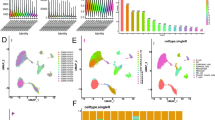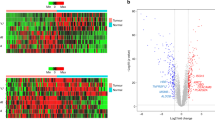Abstract
Gastric cancer (GC) is the sixth most common worldwide malignancy and the third leading cancer cause of death. Early diagnosis and effective after-surgical monitoring can significantly improve survival rates. Previous studies have revealed several serum biomarkers that are elevated in GC patients, including CEA, CA19-9, and CA72-4. However, sensitivity of these biomarkers is below 30%. Identification of more sensitive and specific to GC markers is critical for individualized therapy of this disease. Here we developed an approach for single-cell transcriptomic data analysis that identifies secretory proteins that are abundantly expressed in GC cells and that could be measurable in the blood. Using early GC scRNA-seq data, we identified 19 secretory proteins significantly overexpressed in GC cells. Notably, 4 proteins (IL32, KLK10, KLK7, OLFM4) have demonstrated more superior sensitivity in comparison to conventional serum markers in previous studies. Moreover, 2 proteins, F12 and CFD, were not previously associated with GC and were not utilized for serum-based testing of other malignancies. Proposed approach has a high potential to be used for serum marker identification in other types of cancers and presented here data could be a source for the development of more sensitive and specific diagnostic panel for early gastric cancer detection and patient post-treatment monitoring.
K. E. Medvedev and A. V. Savelyeva—These authors contributed equally to this work.
Access this chapter
Tax calculation will be finalised at checkout
Purchases are for personal use only
Similar content being viewed by others
References
Jemal, A., Bray, F., Center, M.M., Ferlay, J., Ward, E., Forman, D.: Global cancer statistics. CA Cancer J. Clin. 61(2), 69–90 (2011)
Matsuoka, T., Yashiro, M.: Biomarkers of gastric cancer: current topics and future perspective. World J. Gastroenterol. 24(26), 2818 (2018)
Shimada, H., Noie, T., Ohashi, M., Oba, K., Takahashi, Y.: Clinical significance of serum tumor markers for gastric cancer: a systematic review of literature by the Task Force of the Japanese Gastric Cancer Association. Gastric Cancer 17(1), 26–33 (2013). https://doi.org/10.1007/s10120-013-0259-5
Zhang, P., et al.: Dissecting the single-cell transcriptome network underlying gastric premalignant lesions and early gastric cancer. Cell Rep. 27(6), 1934–1947 (2019)
UniProt Consortium: UniProt: a worldwide hub of protein knowledge. Nucleic Acids Res. 47(D1), D506–D515 (2019)
Gu, W., et al.: LncRNA expression profile reveals the potential role of lncRNAs in gastric carcinogenesis. Cancer Biomark. 15(3), 249–258 (2015)
Luo, Z., Zhang, Q., Zhao, Z., Li, B., Chen, J., Wang, Y.: OLFM4 is associated with lymph node metastasis and poor prognosis in patients with gastric cancer. J. Cancer Res. Clin. Oncol. 137(11), 1713 (2011). https://doi.org/10.1007/s00432-011-1042-9
Kwon, C.H., et al.: Serpin peptidase inhibitor clade A member 1 is a biomarker of poor prognosis in gastric cancer. Br. J. Cancer 111(10), 1993–2002 (2014)
Qiu, Y.S., Liao, G.J., Jiang, N.N.: DNA methylation-mediated silencing of regenerating protein 1 Alpha (REG1A) Affects Gastric Cancer Prognosis. Med. Sci. Monit. 23, 5834 (2017)
Kobayashi, Y., et al.: Serum tumor antigen REG4 as a useful diagnostic biomarker in gastric cancer. Hepatogastroenterology 57(104), 1631–1634 (2010)
Kim, J.J., et al.: Upregulation and secretion of kallikrein-related peptidase 6 (KLK6) in gastric cancer. Tumor Biol. 33(3), 731–738 (2012). https://doi.org/10.1007/s13277-011-0267-1
Lillard, J.W., Singh, R., Singh, S.: Detecting cancer with anti-CCL25 and anti-CCR9 antibodies. Morehouse School of Medicine Inc, assignee. United States patent US 8,658,377 (2014)
Lin, S., et al.: Epigenetic downregulation of MUC17 by H. pylori infection facilitates NF-κB-mediated expression of CEACAM1-3S in human gastric cancer. Gastric Cancer 22(5), 941–954 (2019)
Jia, S., et al.: KIAA1199 promotes migration and invasion by Wnt/β-catenin pathway and MMPs mediated EMT progression and serves as a poor prognosis marker in gastric cancer. PLoS One 12(4), e0175058 (2017)
Ganesan, K., et al.: Inhibition of gastric cancer invasion and metastasis by PLA2G2A, a novel β-catenin/TCF target gene. Cancer Res. 68(11), 4277–4286 (2008)
Ishigami, S., et al.: IL-32 expression is an independent prognostic marker for gastric cancer. Med. Oncol. 30(2), 472 (2013). https://doi.org/10.1007/s12032-013-0472-4
Raja, U.M., Gopal, G., Shirley, S., Ramakrishnan, A.S., Rajkumar, T.: Immunohistochemical expression and localization of cytokines/chemokines/growth factors in gastric cancer. Cytokine 89, 82–90 (2017)
Aung, P.P., et al.: Systematic search for gastric cancer-specific genes based on SAGE data: melanoma inhibitory activity and matrix metalloproteinase-10 are novel prognostic factors in patients with gastric cancer. Oncogene 25(17), 2546–2557 (2006)
Wang, F., et al.: High-level expression of PRSS3 correlates with metastasis and poor prognosis in patients with gastric cancer. J. Surg. Oncol. 119(8), 1108–1121 (2019)
Einama, T., et al.: Luminal membrane expression of mesothelin is a prominent poor prognostic factor for gastric cancer. Br. J. Cancer 107(1), 137–142 (2012)
Goto, H., et al.: Adipose-derived stem cells enhance human breast cancer growth and cancer stem cell-like properties through adipsin. Oncogene 38(6), 767–779 (2019)
Matsumura, Y.: Cancer stromal targeting (CAST) therapy. Adv. Drug Deliv. Rev. 64(8), 710–719 (2012)
He, C.Z., Zhang, K.H., Li, Q., Liu, X.H., Hong, Y., Lv, N.H.: Combined use of AFP, CEA, CA125 and CAl9-9 improves the sensitivity for the diagnosis of gastric cancer. BMC Gastroenterol. 13(1), 1–5 (2013)
Marrelli, D., et al.: Prognostic significance of CEA, CA 19-9 and CA 72-4 preoperative serum levels in gastric carcinoma. Oncology. 57(1), 55–62 (1999)
Oue, N., et al.: Serum olfactomedin 4 (GW112, hGC-1) in combination with Reg IV is a highly sensitive biomarker for gastric cancer patients. Int. J. Cancer 125(10), 2383–2392 (2009)
Paltridge, J.L., Belle, L., Khew-Goodall, Y.: The secretome in cancer progression. Biochim. Biophys. Acta 1834(11), 2233–2241 (2013)
Author information
Authors and Affiliations
Corresponding author
Editor information
Editors and Affiliations
Rights and permissions
Copyright information
© 2020 Springer Nature Switzerland AG
About this paper
Cite this paper
Medvedev, K.E., Savelyeva, A.V., Bagrodia, A., Grishin, N.V. (2020). The Potential of Single Cell RNA-Sequencing Data for the Prediction of Gastric Cancer Serum Biomarkers. In: Bebis, G., Alekseyev, M., Cho, H., Gevertz, J., Rodriguez Martinez, M. (eds) Mathematical and Computational Oncology. ISMCO 2020. Lecture Notes in Computer Science(), vol 12508. Springer, Cham. https://doi.org/10.1007/978-3-030-64511-3_8
Download citation
DOI: https://doi.org/10.1007/978-3-030-64511-3_8
Published:
Publisher Name: Springer, Cham
Print ISBN: 978-3-030-64510-6
Online ISBN: 978-3-030-64511-3
eBook Packages: Computer ScienceComputer Science (R0)




